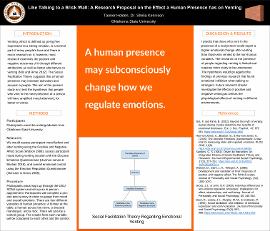| dc.contributor.advisor | Kennison, Shelia | |
| dc.contributor.author | Holden, Tanner | |
| dc.date.accessioned | 2023-04-14T15:33:14Z | |
| dc.date.available | 2023-04-14T15:33:14Z | |
| dc.date.issued | 2023-04-18 | |
| dc.identifier | oksd_URS_2023_holden | |
| dc.identifier.citation | Holden, T., & Kennison, S. (2023, April 18). Like talking to a brick wall: A research proposal on the effect a human presence has on venting. Poster session presented at the Oklahoma State University Undergraduate Research Symposium, Stillwater, OK. | |
| dc.identifier.uri | https://hdl.handle.net/11244/337408 | |
| dc.description.abstract | Venting, which is defined as giving free expression to a strong emotion, is a normal part of many people’s lives and there is much research on it; however, most research examines the positive and negative outcomes of it through different attributions as well as better alternatives to venting. The Social Facilitation Theory suggests that a human presence may increase activation and arousal in people. The aim of the present study is to test the hypothesis that the venter will benefit from a venting session more when there is another person nearby. Three other conditions will be tested: another person far away, a mannequin, and a rock. The prediction is that having a human presence, meaning there is a neutral stimulus as the human vented to will offer no advice or judgment, will have an effect on the venter, whether in a positive or negative way and the effect will not occur in the other three conditions. Participants will be recruited from the Department of Psychology SONA system and randomly assigned to one of four conditions (a human close by, a human faraway, a mannequin, and a rock). Participants will be instructed to vent about a topic from a provided list (e.g., family, friends, finances). The participants complete a survey with questions about their thoughts about venting, personality, emotional regulation, mood, and demographics. Participants will also take a post-survey with questions about their emotions while venting, mood, and feelings about the benefits of the venting session. The mood before venting and after venting will be compared across conditions. If the study finds that participants felt better after venting to a human as opposed to an empty presence then it may show that simply being heard improves mood and may be better than offering advice. If they felt worse, then it may show that a lack of positive or negative attributions leads to individuals feeling ignored. In the event of the different levels of human presence have little to no effect on participants, it may show that Social Facilitation Theory does not apply to emotions and would require further research. | |
| dc.format | application/pdf | |
| dc.language | en_US | |
| dc.publisher | Oklahoma State University | |
| dc.rights | In the Oklahoma State University Library's institutional repository this paper is made available through the open access principles and the terms of agreement/consent between the author(s) and the publisher. The permission policy on the use, reproduction or distribution of the article falls under fair use for educational, scholarship, and research purposes. Contact Digital Resources and Discovery Services at lib-dls@okstate.edu or 405-744-9161 for further information. | |
| dc.title | Like talking to a brick wall: A research proposal on the effect a human presence has on venting | |
| osu.filename | oksd_URS_2023_holden.pdf | |
| dc.description.department | Psychology | |
| dc.type.genre | Poster | |
| dc.type.material | Text | |
| dc.type.material | Image | |
| dc.subject.keywords | venting | |
| dc.subject.keywords | emotional regulation | |
| dc.subject.keywords | social facilitation theory | |
| dc.subject.keywords | mood | |
